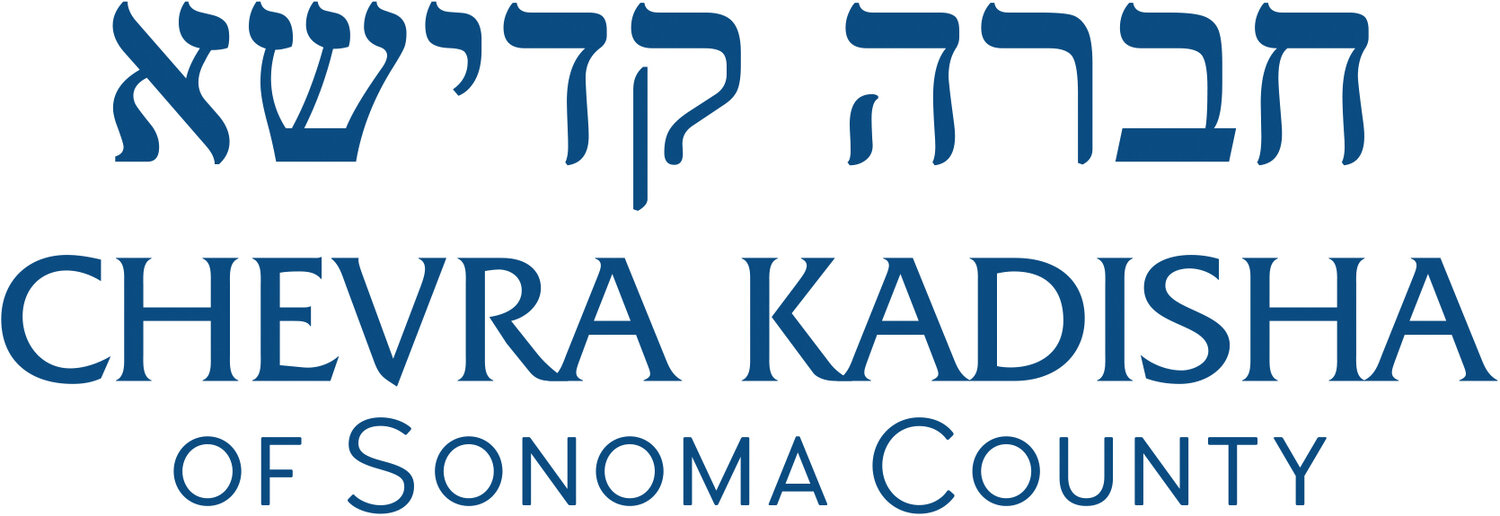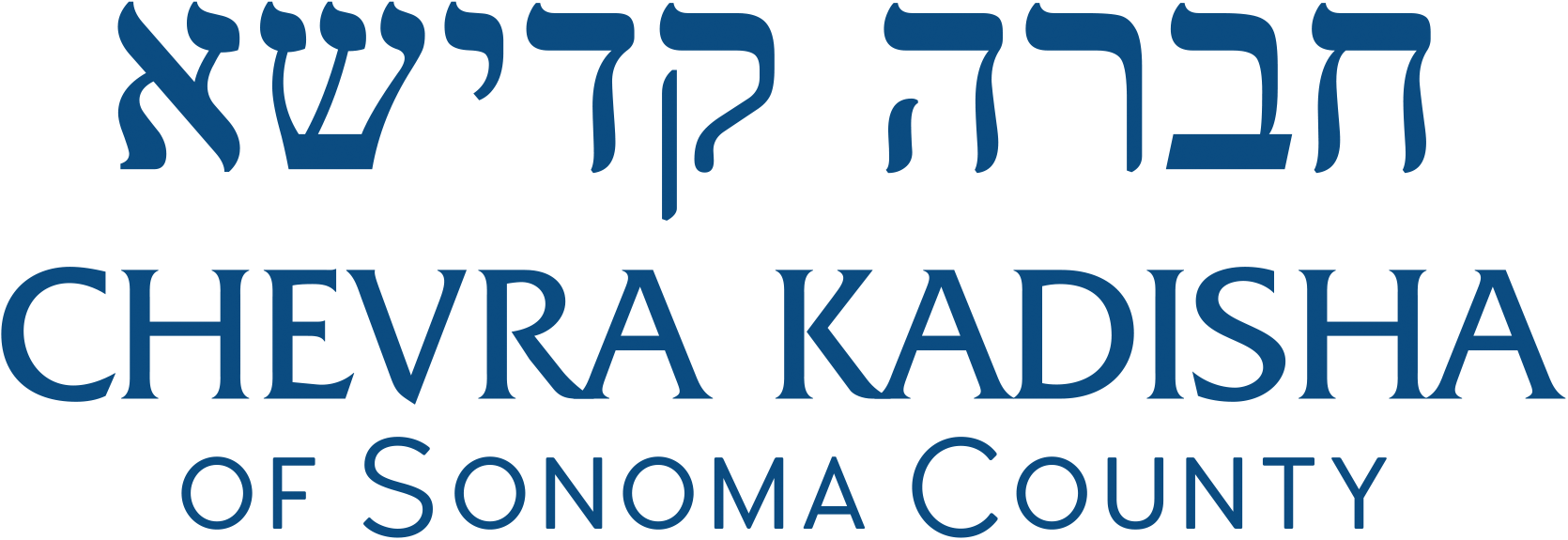

For thousands of years Jews have practiced a beautiful tradition of assisting in the journey from death to burial with respect, kindness and simplicity.
What is the Chevra Kadisha?
We are a group of local volunteers across Sonoma County who have been trained in Jewish traditions and practices around death and the preparation for burial. We are dedicated to care for the deceased with respect and honor and consider this one of the highest mitzvahs.
A Chevra Kadisha (sacred society) is an organization of Jewish volunteers who see to it that deceased individuals are prepared for burial according to Jewish tradition and are protected (watched over) until burial. Two of the main requirements are the showing of proper respect for the deceased, and the ritual cleansing and subsequent dressing of the body for burial.
What does the Chevra Kadisha do?
The Chevra Kadisha will arrange for and conduct the taharah (ritual cleansing) of the deceased: this includes ritual washing, pouring of water, dressing in a plain shroud, and placing into a plain casket. This usually occurs at the funeral home.
Once the body is prepared, the Chevra Kadisha arranges for Shomrim or Guardians: these are volunteers who stay with/watch over the body from the Taharah until the burial, so your loved one will not be alone. This also usually occurs at the funeral home in a quiet room. Volunteers take shifts over 24 (or more) hours until the burial.
We observe and practice ancient rituals that have been preserved in communities throughout the world. We sincerely believe these observances are of great benefit: they both honor the deceased and strengthen the living.
The support of our community-based Chevra Kadisha is available to any Jew, regardless of affiliation or level of observance in their lifetime.
Requesting the Chevra Kadisha
Making this choice will assure you of a beautiful, dignified burial for your loved one according to Jewish tradition.
When death occurs call a funeral home, or your rabbi. They will help guide you to arrange for the funeral and burial. Regardless of affiliation, level of observance, or gender identity the Chevra Kadisha will be of service to you at this time.
It is helpful to make your desires to use the Chevra Kadisha known to your loved ones. Making pre-need arrangements at a Sonoma County funeral home can be done verbally or preferably in a written document that you share with your loved ones. Completing this in advance will spare your family from having to guess your wishes.
Please contact the funeral home, your rabbi or the Chevra Kadisha regarding any questions you may have.
Taharah:
The Ritual of Pouring Water
In Jewish tradition, we are all holy beings created in the image of the Divine. This means that when we die, our body is considered a holy thing and should be treated with respect and dignity.
Jewish tradition also considers the holy spiritual aspect of a human being, the soul, to be eternal, returning to the Divine upon death. So when a person dies, we have a special ritual to prepare the body for burial and at the same time, midwife the soul from this world to the next. This beautiful ritual is called taharah, from the Hebrew root having to do with purification. The ritual includes physical washing of the body along with a powerful spiritual liturgy, and a pouring of water, all intended to assist the soul on its journey.
The tahara ritual is concluded with dressing the deceased in a plain white shroud. The shroud is similar to what the High Priest wore in the Temple when he entered the Holy of Holies on Yom Kippur. He was prepared to meet the Divine face to face, just as we prepare the deceased to meet the Divine face to face. The shroud symbolizes that we are all equal in death. The deceased is then placed in a simple, plain wooden casket to symbolize that we are all equal in death.
Shmirah: The Ritual of Guarding
Shmirah is the ritual of guarding the deceased’s body; in some ways it can be likened to an honor guard. Some prefer to call it “accompaniment” as we are ensuring that the soul does not feel alone during this time in which it is adjusting to not having a body. It is traditionally done from the time of death until burial. In some communities shmirah is not begun until after the taharah. It is generally done in shifts, with each person doing the task for a few hours.
A shomer watches over the deceased from the time the deceased comes under the responsibility of the Chevrah Kadisha until the funeral and burial. In earlier times, the guarding of Jewish bodies was a physical concern, while today it provides comfort to the soul of the deceased and to the grieving families, and allows community members an additional opportunity to participate in Chevrah Kadisha activities.
Becoming a Volunteer in our Chevra Kadisha
There are many different ways to be involved in our Chevra Kadisha.
Become a Shomer:
Being with the body of the deceased as a guardian or shomer is an important mitzvah. Your presence expresses respect or kevod ha-met for the body and soul of the deceased. The body or met was the vessel that housed the person’s soul during their lifetime. You are there to protect the sanctity of the met and offer consolation to the soul. Therefore, he or she should not be left unattended. In order to accomplish this we have people be with the deceased in two hour shifts from after they are enclosed in the casket (aron) until burial.
We welcome new participants to our shmira team. Please contact us if you are interested. (707)322-1631 or (707)546-6043
Participate in Tahara:
We welcome new participants to our tahara team. Please contact us if you are interested. (707)322-1631 or (707)546-6043
Other Opportunities to be Involved:
We need people to help create educational events, update our web presence, help schedule shmira and other organizational tasks. Please contact us if you are interested. (707)322-1631 or (707)546-6043
Funeral Homes
Check out many interesting articles education, and training along the Jewish end-of-life continuum: from visiting the sick and pre-planning, to care for the body after death, to providing comfort to the mourners.
Check out the many courses and learning opportunities at
Contact
Feel free to contact us with any questions.
Email
pattybernstein@sonomajewishburial.org
ndotti@sonomajewishburial.org
Phone
Nancy (707)322-1631, or Patty (707) 953-4385, or Marc (707) 481-0780












